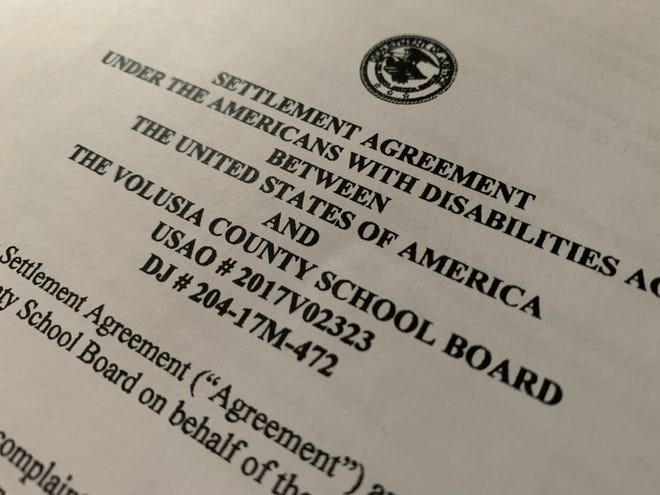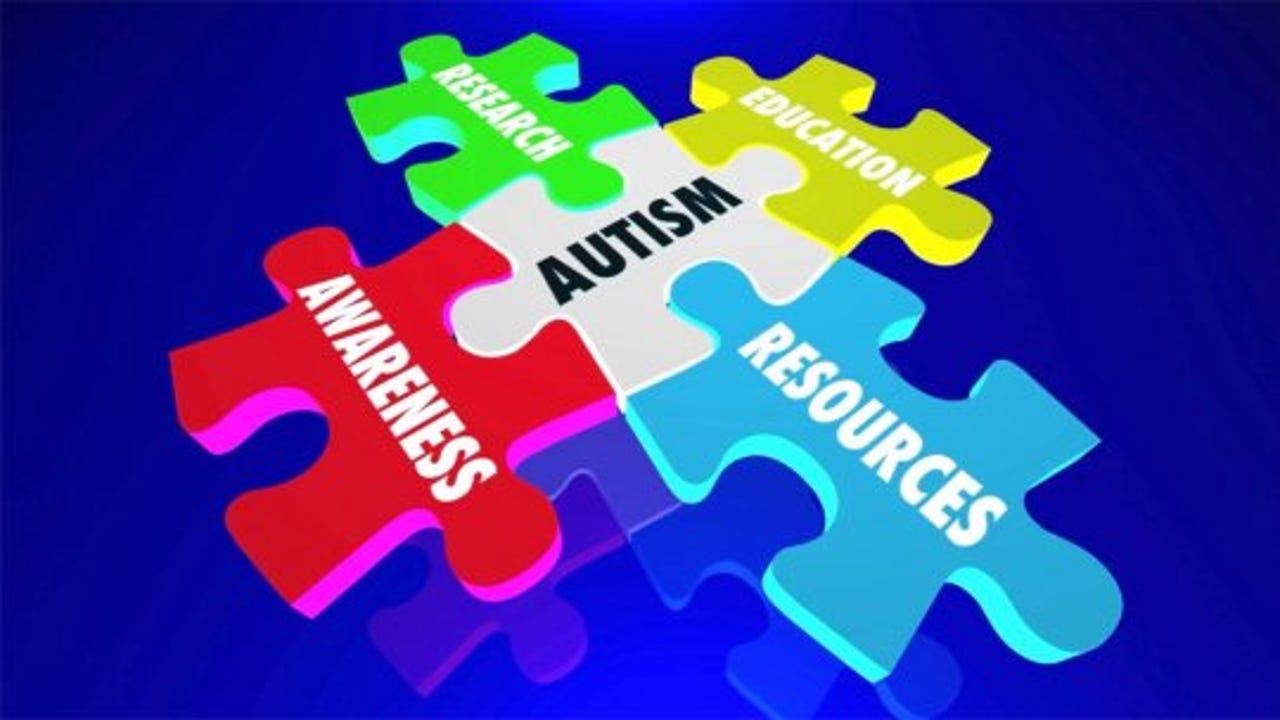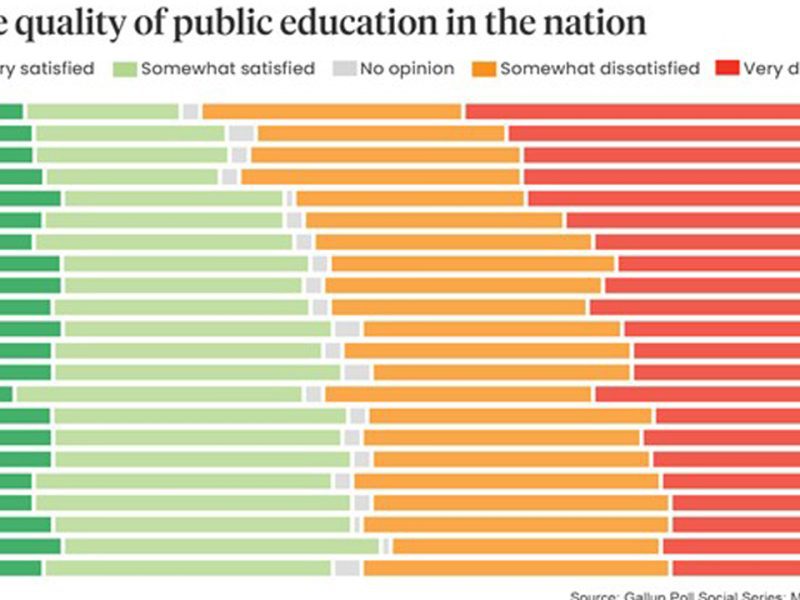DOJ finds Volusia Schools discriminated against students with autism
The Daytona Beach News-Journal | By Cassidy Alexander | August 5, 2021
Story Highlights
- Students with disabilities said the district’s practices excluded them by removing them from school.
- The federal investigation does not punish the district or make it liable.
- Among the steps laid out in the settlement, the district must hire an outside consultant.
The U.S. Department of Justice has reached a settlement with the Volusia County School District after it found the district’s “systemic and discriminatory practices” were punishing students with disabilities for behaviors the students couldn’t control.
Now, Volusia schools have three years to change — which district officials say is already underway.
The federal investigation into the district’s practices began in 2017, when an attorney filed a complaint on behalf of 11 students with disabilities, nine of whom were diagnosed with autism spectrum disorder.
The DOJ found the students’ claims to be true. The district relied on overly punitive disciplinary tactics and law enforcement to address behaviors that are known, or should be known manifestations of the students’ disabilities. The district also “routinely sought to exclude these students by removing them,” by asking parents to pick children up from school or asking them to keep the children home, by suspending the children, or by using Baker Act procedures to involuntarily hold children at hospitals.
Put another way, the practices at some schools in the district created a system that made parents fear sending their children to school, lest they be unfairly punished for behaviors the school was supposed to be helping them manage.
“Graduation became the secondary focus,” said Carl Tews, whose son has autism and is now going into the fourth grade. He was one of the students in the complaint. “It was, ‘How do you make sure Jackson doesn’t go to jail just for going to school?’ And you don’t want that to be the cornerstone of public education for autistic students.”
The settlement, which comes after a four-year investigation, is not punitive and is not an admission of liability or wrongdoing on the district’s part. It gives the district three years to implement new policies and practices, hire new personnel dedicated to oversight, and implement new systems for data reporting and tracking, and checks and balances. During that time, Volusia County Schools will be subject to federal oversight.
“Students should never be denied their education on the basis of disability, and we will not yield until the full measure of rights guaranteed by the (Americans with Disabilities Act) is a reality for all,” said Assistant Attorney General Kristen Clarke of the Justice Department’s Civil Rights Division in a DOJ release. “The department is committed to enforcing the law to make sure schools meet the needs and respect the rights of all their students.”
In a statement to The News-Journal via email, district spokeswoman Kelly Schulz stated that the allegations addressed by the settlement date back to before 2017.
“The concerns… have been vigorously addressed in the district’s strategic plan and will be enhanced by the tracking and reporting requirements of the agreement going forward,” Schulz stated. “We believe the district’s previously initiated changes to the student code of conduct and enhancements required by the agreement will benefit all students as we work to recognize students’ challenges and disabilities sooner and provide early, positive interventions.”

Previous findings
Autism is a developmental disorder that affects social skills, communication and behavior. It has become increasingly prevalent in the U.S. In the last school year, there were 1,233 students with autism spectrum disorder in Volusia County. Ten years ago, there were 387.
In the majority of cases, such students are placed in traditional classrooms and given supports to help mitigate disability-related behaviors. They might get breaks to deal with sensory overloads, or paraprofessionals to help them understand instructions on assignments.
In 2019, The News-Journal interviewed parents, teachers, advocates, district officials and other experts on the system in place for educating students with autism in Volusia County. The newspaper’s findings were two-fold, and are supported by the conclusion of the DOJ’s investigation.
The newspaper found that as the number of students with autism more than tripled in Volusia County, the level of staffing, funding and training for general teachers had stagnated — creating a system where families had to fight to get their children the help they are legally entitled to receive. It also found that the number of children with autism in Volusia County who are Baker Acted was up 500% over four years, even though experts say it will almost never help that child overcome whatever behaviors they were exhibiting.
The News-Journal spoke to families whose children had been taken in police cars and involuntarily held at the hospital for behaviors related to their disability; to families who took their children out of the public school system for fear of retribution for their behaviors; and to families who had to retain professional advocates or lawyers to help them obtain the necessary support services for their children to go to school.
“The truth is that these kids have special needs. They have extraordinary needs. We should match their abilities with the resources to ensure an education is provided to all,” Tews said.
“That really is the heart of what public education is supposed to be,” he continued, “and I think the DOJ findings say, ‘Yeah, we’re going to make sure you do that.'”
What the settlement says
The 19-page settlement agreement with the DOJ requires the district take a slew of steps to correct and prevent the discrimination against students with disabilities moving forward.
In part, it should generally prohibit the informal or undocumented removal of students with disabilities from classrooms, like permitting the student to roam from class or encouraging parent to pick up students for behavioral issues. The district must update its policies and procedures to include options for positive interventions to use before discipline, as well as clear steps that cut down on opportunities for administrator discretion. The district must also include clear guidelines for when the school may engage law enforcement.
A large portion of the settlement is about establishing systems for recording and tracking all removals of students with disabilities from classroom instruction. Schools will be required to document and review each removal, as well as document what positive corrective measures they used before resorting to discipline. Families will have the option to appeal discipline action. And any involvement of law enforcement must be documented and stored in a central database — something that did not previously exist.
The settlement further requires that all law enforcement personnel and school guardians who work with students with disabilities and all employees and contractors who come in contact with students with autism spectrum disorder receive training about the rights of students with disabilities, instruction in the characteristics and needs of those students, and behavior management strategies. The training must be conducted in-person. Previously, such training was not required.
The district must hire an outside consultant to evaluate and monitor discipline practices by meeting with each principal two times a year, as well as an ADA compliance officer who will make sure it complies with the settlement. And the district will regularly submit reports to the federal government that show progress and compliance with the settlement.
The district is also required to notify parents and guardians of all students of the settlement, and share where it can be accessed. It has two weeks from Aug. 2 to do so.
Read the full settlement on the DOJ’s website.
Staff reporter Nikki Ross contributed to this report.






